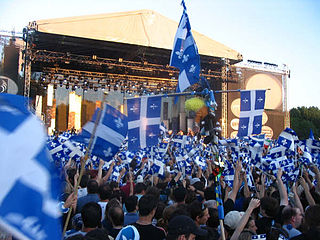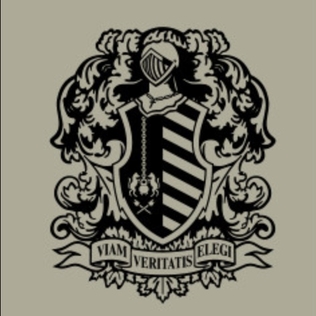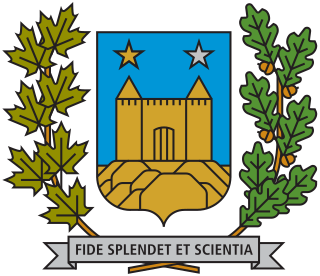Related Research Articles

Jean Lesage was a Canadian lawyer and politician from Quebec. He served as the 19th premier of Quebec from July 5, 1960, to June 16, 1966. Alongside Georges-Émile Lapalme, René Lévesque and others, he is often viewed as the father of the Quiet Revolution. Quebec City International Airport was named in his honour on March 31, 1994, and a provincial electoral district, Jean-Lesage, was named for him as well.

Quebec nationalism or Québécois nationalism is a feeling and a political doctrine that prioritizes cultural belonging to, the defence of the interests of, and the recognition of the political legitimacy of the Québécois nation, particularly its French Canadian population. It has been a movement and a central issue in Quebec politics since the beginning of the 19th century. Québécois nationalism has seen several political, ideological and partisan variations and incarnations over the years.

The Université de Sherbrooke is a French-language public research university in Sherbrooke, Quebec, Canada, with a second campus in Longueuil, a suburb on the South Shore of Montreal. It is one of two universities in the Estrie region of Quebec, and the only French-language university for the region.
The 1960 Quebec general election was held on June 22, 1960, to elect members of the Legislative Assembly of Quebec, Canada. It was one of the most significant elections in Quebec history, rivalled perhaps only by the 1976 general election. The incumbent Union Nationale, led by Antonio Barrette, was defeated by the Quebec Liberal Party, led by Jean Lesage.

Jacques Ferron was a Canadian physician and author.
Marcel Chaput was a scientist and a militant for the independence of Quebec from Canada. Along with some 20 other people including André D'Allemagne and Jacques Bellemare, he was a founding member of the Rassemblement pour l'indépendance nationale (RIN).

Sainte-Foy is a former city in central Quebec, Canada alongside the Saint Lawrence River. It was amalgamated into Quebec City at the start of 2002. Most of the formerly independent municipality of Sainte-Foy is located in the borough of Sainte-Foy–Sillery–Cap-Rouge — initially as one of the two constituent districts of the former borough of Sainte-Foy–Sillery. On 1 November 2009, Sainte-Foy was subdivided into four separate districts: Cité-Universitaire, Plateau, Saint-Louis, Pointe-de-Sainte-Foy, when the borough of Sainte-Foy–Sillery–Cap-Rouge was formed.

Michel Chartrand was a Canadian trade union leader from Quebec.

The Royal Military College Saint-Jean, commonly referred to as RMC Saint-Jean and CMR, is a Canadian military college and university. It is located on the historical site of Fort Saint-Jean, in Saint-Jean-sur-Richelieu, Quebec, 40 km south of Montreal. RMC Saint-Jean is an arm of the Canadian Military College (CMC) system that provides two college-level programs in Social Science and Science, which are closely integrated with the undergraduate programs offered by the Royal Military College of Canada. RMC Saint-Jean was granted independent university status in 2021, and it currently offers a bachelor's degree in International Studies.

The National Order of Quebec, termed officially in French as l'Ordre national du Québec, and in English abbreviation as the Order of Quebec, is an order of merit in Quebec. Instituted in 1984 when Lieutenant Governor Jean-Pierre Côté granted royal assent to the Loi sur l'Ordre national du Québec, the order is administered by the Governor-in-Council and is intended to honour current or former Quebec residents for conspicuous achievements in any field, being thus described as the highest honour in Quebec. In 1986, the order was expanded to include honorary membership for people outside Quebec.

Collège Jean-de-Brébeuf is a subsidized private, previously Jesuit French-language educational institution offering secondary school and college-level instruction in Quebec. It was originally a boys' school, though since 2014 it now admits girls too.

Jacques Chagnon is a retired Canadian politician who served in the National Assembly of Quebec from 1985 to 2018. A member of Quebec Liberal Party, he was appointed Minister of Education in 1994, when his party went back on to form government in 2003, he was appointed Minister of Public Security until 2005.

The Université de Montréal is a French-language public research university in Montreal, Quebec, Canada. The university's main campus is located in the Côte-des-Neiges neighborhood of Côte-des-Neiges–Notre-Dame-de-Grâce on Mount Royal near the Outremont Summit, in the borough of Outremont. The institution comprises thirteen faculties, more than sixty departments and two affiliated schools: the Polytechnique Montréal and HEC Montréal. It offers more than 650 undergraduate programmes and graduate programmes, including 71 doctoral programmes.

LaSalle College was founded in Montreal, in the province of Quebec, Canada, in 1959 by Jean-Paul Morin. The college offers over 60 programs DCS and ACS programs. It is the largest bilingual college in North America, with 7 specialized schools: Art, Design and Communication, Business and Management, Education and Social Sciences, Fashion, Gaming, Animation and VFX, Hospitality and Tourism and Information Technology.

Fort Saint-Jean is a fort in the Canadian province of Quebec located on the Richelieu River. The fort was first built in 1666 by soldiers of the Carignan-Salières Regiment of France who had travelled to New France to assist the young colony. It was part of a series of forts built along the Richelieu River. Over the years, it was destroyed and rebuilt several times, but it is, after Quebec City, the military site that has been occupied non-stop for the longest time in Canada. The fort is designated as a National Historic Site of Canada, and it currently houses the Royal Military College Saint-Jean. The fort has been continually occupied since 1748, and is the core from which the city of Saint-Jean-sur-Richelieu, Quebec grew around. Fort Saint-Jean played a crucial role in the British defense strategy during the 1775 American invasion of the Province of Quebec.

David Saint-Jacques is a Canadian astronaut with the Canadian Space Agency (CSA). He is also an astrophysicist, engineer, and a physician.

The Troupes de la marine served in Canada during the period 1683–1715. The Marines were first sent to Canada in 1683 after an upsurge of Iroquois hostilities. The basic unit of the Marines in Canada was the company, with three or four officers, two sergeants, four corporals and lance-corporals, and a total complement of 33 to 52 officers and other ranks. The number of marines during the period peaked in 1688 with a total strength of 1,750 officers and other ranks. The other ranks were recruited in France, and were mostly volunteers, although Canada was not an attractive place to serve. Unskilled labourers dominated and almost a third of them came from the western parts of France. On the other hand, the officer corps was the subject of a gradual process of canadianization, with about a third of the officers serving in 1715 born in Canada.
Louise Gagnon-Arguin is a Canadian archivist.
References
- ↑ "The Canadian Officers' Training Corps – an Imperial History". 4 April 2013.
- ↑ fr:Corps-écoles des Officiers canadiens
- ↑ Photographic Archives "BAnQ numérique".
- ↑ Ottawa daily «Le Droit» front page article, September 12, 1945 https://numerique.banq.qc.ca/patrimoine/details/52327/4195192
- ↑ Robert Roy, «No Country for Young Men» https://www.youtube.com/watch?v=o5K3hLiS2Wo
- ↑ McGill University, Memorial Site http://www.archives.mcgill.ca/public/exhibits/mcgillremembers/memorial_fr.htm
- ↑ Thesis, University of Ottawa, Anne Millar, 2015: «Wartime Training at Canadian Universities during the Second World War» https://ruor.uottawa.ca/bitstream/10393/33146/1/Millar_Anne_2015_thesis.pdf
- ↑ "Personnel Records of the First World War". Library and Archives Canada. 29 June 2016. Retrieved 2019-12-18.
- ↑ ""The soldier who became an antimilitarist"". Le Devoir. September 2007. Retrieved 2021-04-24.
- ↑ "Jean-Paul L'Allier". Assemblée nationale du Québec. Retrieved 2021-04-24.
- ↑ "«Le Canada anglais de Jacques Ferron (1960-1970)» Thesis, Queen's University, S.A.Murphy 2009". Doczz.fr. Retrieved 2021-04-24.
- ↑ "Jean Lesage". Assemblée nationale du Québec. Retrieved 2021-04-24.
- ↑ "Fernand Foisy, «Michel Chartrand: Les dires d'un homme de parole» (1997)". UQAC. 2 February 2005. Retrieved 2021-04-24.
- ↑ "Don Wright – Wright Family Performing Arts and Entertainment Centre Foundation" . Retrieved 2023-12-05.